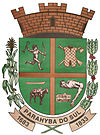Paraíba do Sul, Rio de Janeiro
| Municipality of Paraíba do Sul | |||
|---|---|---|---|
 |
|||
|
|||
| Nickname(s): The Queen of Minerals Waters | |||
| Motto: City of Peace | |||
 |
|||
| Coordinates: 22°09′43″S 43°17′34″W / 22.16194°S 43.29278°W | |||
| Country | Brazil | ||
| Region | Southeast | ||
| State | State of Rio de Janeiro | ||
| Government | |||
| • Mayor | Márcio Abreu de Oliveira (DEM) | ||
| Area | |||
| • Total | 580.803 km2 (224.249 sq mi) | ||
| Population (2010 est.)[1] | |||
| • Total | 41,088 | ||
| • Density | 71/km2 (180/sq mi) | ||
| Time zone | UTC-3 (UTC-3) | ||
| • Summer (DST) | UTC-2 (UTC-2) | ||
| Website | http://www.paraibanet.com.br/ | ||
Coordinates: 22°09′43″S 43°17′34″W / 22.16194°S 43.29278°W
Paraíba do Sul (Portuguese pronunciation: [paɾaˈibɐ du ˈsuw]) is a municipality located in the Brazilian state of Rio de Janeiro. Its population was 41,088 (2010) and its area is 581 km².
Paraíba do Sul is the pioneer municipality of Serra Fluminense, disseminator of civilization in what was called the 18th century backlands of Paraiba.
The city was born near a backwater discovered in Paraíba do Sul River in 1681 by Garcia Rodrigues Paes son of Fernão Dias Paes Leme. The 20 years boy knew that in the rare backwater flowing river was directly north the city of Rio de Janeiro, sea port turn meant that the gem mines discovered by his father, late that same year. In Lisbon in 1682, had the disappointment of them only know tourmalines, but promised Pedro II the most direct route there may be between the mines and the March The king promised him lands and privileges, provided that discovered gold and precious stones.
In 1683, Garcia opened backwater on the farm origin of the city, fifteen years later, discovered gold, the construction workforce of the Way that historians call the New. The Farm Parahyba fueled with corn fields, river fish and game from the virgin forest to front-of-work Indians puris enslaved by aggregates Garcia, curibocas guainás Plateau of São Paulo. In 1698 to 1700 opened the stretch of the Paraíba to Rio de Janeiro, and even 1704 which hit the Mantiqueira Mountains. Then, in the current region Barbacena, the New Way joined the Elder, who came from São Paulo.
...
Wikipedia


